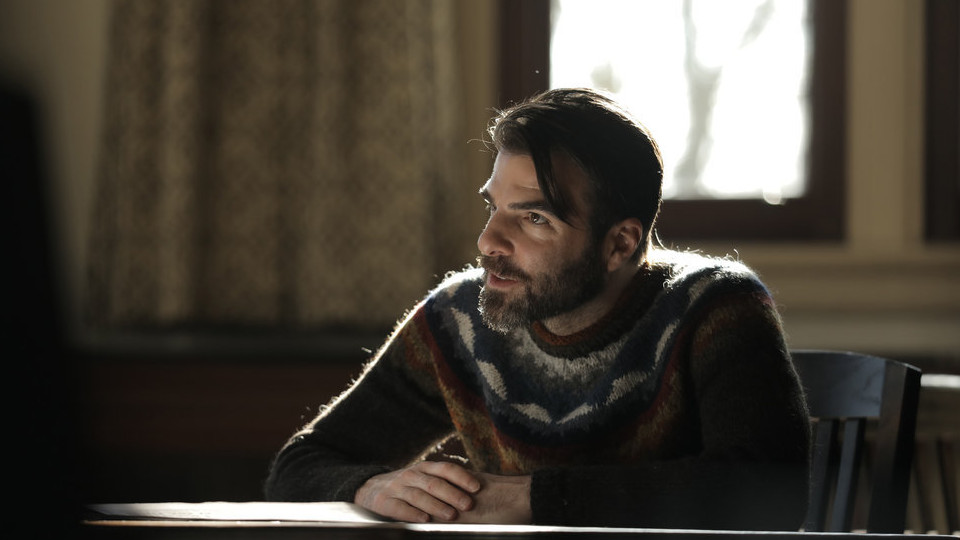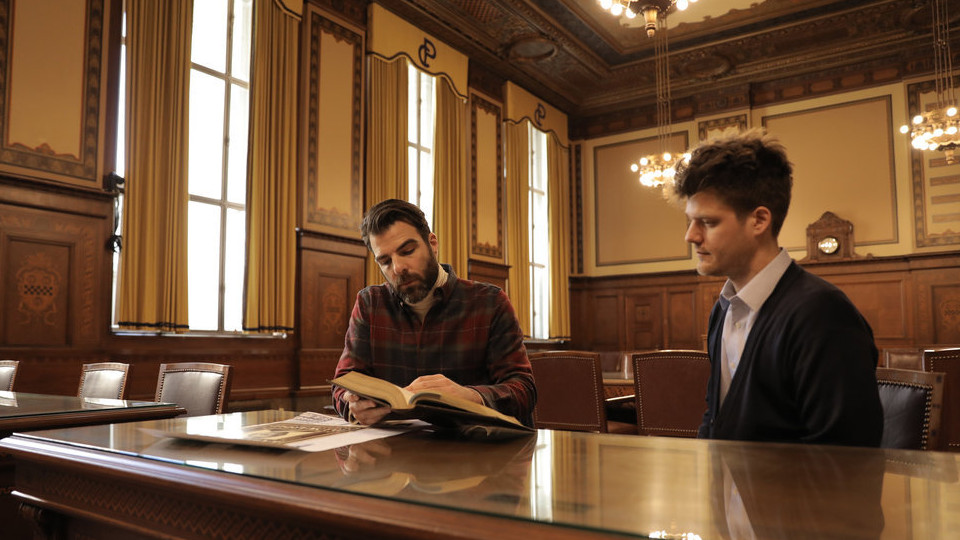The Season Finale of Who Do You Think You Are? Covers Pittsburgh and Italy for Actor Zachary Quinto
Well folks, we’ve reached the end of this season of Who Do You Think You Are? Though I would have loved a few more episodes, I’m pleased with this one and feel it ends things on a high note. They do so with an actor I’ve known since the early 2000s, none other than Zachary Quinto.
There were a lot of unexpected things about Quinto in this episode. For one thing, it starts with him playing the banjo, showing off his great singing voice. Not what I thought we’d get from an actor I first knew as a superpowered serial killer in Heroes, then as Spock, and even a very bad doctor in American Horror Story. For another, I thought Zach’s last name indicated Hispanic descent, but that’s not true.
That said, it’s really no surprise Zach was such a great actor since he got the itch when he was only 11, thanks in large part to his mom. She auditioned him without his knowledge for a singing and dancing troupe, and he was a fan of acting ever since.

Zach grew up in Pittsburgh, and tragedy struck at a young age. When he was only 7, his father Joseph died of cancer. This forced his mother to go from stay-at-home mom to breadwinner, and she quickly discovered an inner strength she never knew she had. Zach clearly loved his father, and regrets not learning more about his Italian roots, both due to his father’s untimely demise and the fact that his paternal grandparents died before he was born. But before we learn more about that, Zach dives into his maternal ancestor, P.J. McArdle.
Zach heads to Pittsburgh to learn more and does so with the help of Edward Slavishak at the Carnegie Library. P.J. was both a businessman and politician. But before that, he worked to support an Amalgamated metals union. First, he gained recognition in Indiana. A document shows how popular he was, even at the young age of 25. Even more noteworthy, P.J. uses the phrase “live long and prosper” some 112 years before his grandson played Spock in the Star Trek movies.
A few short years later, P.J. became the union president and moved to Pittsburgh. That was key since Pittsburgh was the home to the labor movement, and every national union even had its own newspaper. This particular union’s work was incredibly dangerous, and when P.J. became president, they were being treated as obsolete after years of working in deadly conditions with poor pay. Worse, machines were being eyed to replace skilled human labor. P.J. had his work cut out for him as president, and found everything in steep decline. Despite those odds, he took the position knowing how difficult it might be.
Next Zach heads to the University of Maryland to discover how P.J. fared after becoming president. Professor of History Chad Pearson reads a union propaganda piece written by P.J. It discusses the dignity of work, and how those of different ethnic backgrounds should band together to strike. It shows how far-sighted his grandfather was. Unfortunately, this David was against a mighty Goliath in JP Morgan (yes, that one), and things got incredibly difficult.
A year after the strike, P.J.’s brother died in a non-union mine accident. Soon afterward, the strike he helped helm ended after 14 months. Regardless, his journey wasn’t over yet, and he leveraged his union work to transition into politics. Returning to Pittsburgh, Quinto learns about his life after that with archivist Nicholas Hartley. Turns out, P.J. was on the City Council for 28 years and died at 65 as a beloved representative. Before leaving, Zach visits the road named after him, the P.J. McArdle Roadway. Next, Quinto visits a lead from Ancestry historian Jenn Utley and heads to Italy.

Quinto’s 3x paternal great-grandparents, Pietro Cafolla and Clemenzia Rosato, lived in Lenola during a time of upheaval. Lucy Riall helps Zach learn more about them. In the 1800’s Italy was a bunch of separate kingdoms instead of a nation-state, all with different rulers. Everything was unstable and dangerous. Then in 1860 nationalists took over.
With Lucy’s help, Zach combs some archives. One document from 1864 shows that Pietro was attacked by brigands while doing fieldwork. In the period from 1861-65, there was a war between the new Italian kingdom and the old Bourbon government. The latter used brigands to spread fear, rob, and destabilize the people. And Pietro got kidnapped and in that ensuing conflict.
A second document shows Pietro was held hostage for a couple of weeks. Despite all that, he managed to survive miraculously unscathed and lived to 75 years old. Zach decides to end his journey by heading to Lenola for more details about Pietro, and a pleasant surprise.

He meets a surveyor named Gianfranco and a translator named Maria. Turns out, Zach and Gianfranco are related, and their grandparents were brothers. As a surveyor, Gianfranco shows Zach around and indicates places where walls were made from bombed houses. Quinto takes it all in, and feels like a more complete person as a result, with a renewed respect for both sides of his family tree.
Overall another great episode of Who Do You Think You Are? The only odd note was that Quinto apparently has a brother of his own, but never mentions his name or talks about him other than that. Despite that peculiarity, Quinto was charming and surprisingly likable. Thanks for reading, and stay tuned to The Workprint for more pop culture coverage!
